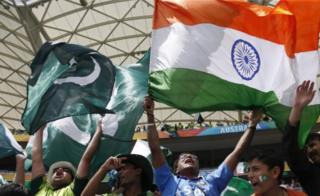Could Kashmir conflict hit Cricket World Cup?
If you are reading the headlines in the Indian media, you get the impression that India might forfeit the 16 June group game against Pakistan in Manchester.
This is in protest against this month’s suicide attack in Kashmir in which more than 40 Indian paramilitary police were killed. A Pakistan-based militant group has taken responsibility.
Other inspired leaks talk about India putting pressure on the organisers to ban Pakistan from the tournament. It is far from clear how this can happen. Why should the other eight teams participating in the 46-day-long tournament acquiesce to such a request, considering that it will jeopardise the tournament and their sporting relations with Pakistan.
Officials running Indian cricket held a meeting on Friday and said they would lobby cricket playing nations to “severe ties with any nation that is a terrorist hub”. No decision has been taken on 16 June match, a senior official said.
Outrage and revulsion over the attack has mounted at home, putting Narendra Modi’s ruling Bharatiya Janata Party government under pressure to retaliate against Pakistan. And cricketing relations between the nuclear-armed South Asian neighbours have almost always been as turbulent as their political relations.
The two sides have not played a bilateral series since the 2008 Mumbai terror attacks. There have been long periods in the past too when they haven’t played each other: cricketing contact, for example, resumed in 1978 after a 18-year-long hiatus due to hostilities. Pakistani players have also been kept out of the Indian Premier League, the world’s most lucrative cricket tournament.
George Orwell famously called sports “war minus the shooting”. In the days of peak India-Pakistan hostilities, many would call the contest “war minus nuclear missiles”. India-Pakistan games in the past have also been charged with nationalism and chauvinism.
A Test match pitch was once dug up in Delhi by an extremist right-wing group. The Pakistani team fielded with helmets in a match in Ahmedabad. A game in Karachi saw the stands being set on fire.
Read more from Soutik Biswas
Such anger and angst have abated over time. But as Ramachandra Guha wrote in A Corner of a Foreign Field, a magisterial history of Indian cricket, “the disagreements between Hindus and Muslims before 1947, and between India and Pakistan since, have thrown a long shadow across the playing fields in the world”.
The June game at Old Trafford is pivotal for the prestige and finances of the tournament. Nearly half a million fans have applied for the 25,000 tickets – to put that in perspective, some 270,000 applications have been made for tickets for the finals. Tournament director Steve Elworthy calls the contest “probably one of the biggest sporting events in the world”.
Indians who support the match boycott say forfeiting points in a group game will not hurt India in a round robin tournament. To be sure, this is not unprecedented. In the 2003 edition, for example, England lost out on four World Cup points after being told that they would not be allowed to relocate the game from Harare to South Africa because of security concerns related to travel to Zimbabwe.
But cancellation of what is arguably the biggest and most-awaited match of the tournament would hugely hurt the cricket World Cup.
India has never lost a World Cup game to Pakistan. In 1999, at the height of a limited war between the two countries in Kargil, the two sides played a low-scoring game in Manchester and India won by 47 runs. On the day of the match, six Pakistani soldiers and three Indian officers were killed in Kargil.
As Indian MP and author Shashi Tharoor says: “To forfeit the match this year would not just cost two points: it would be worse than surrender, since it would be defeat without a fight”.
Follow Soutik at @soutikBBC
Source: Read Full Article



